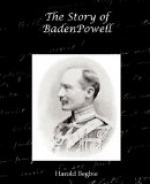But do not let us lose sight altogether of Baden-Powell as the whimsical humourist. There are two stories in the regiment which reveal him in this light very nicely. He was once walking with a friend on the esplanade of some English seaside place, and the day was piping hot. Suddenly, without explanation of any kind, B.-P. sat himself down on the kerb, placed his billycock hat solemnly on his knees, and buried his face in a flaming red handkerchief. This unprecedented sight stirred the depths of the one and only policeman’s heart, and he strode valiantly across the road, prepared to do his duty at all costs. Touching B.-P. upon the shoulder with his white cotton glove, the constable demanded, in a deep voice, “Arnd, whaaet’s the matter wi’ you, eh?” Slowly removing the handkerchief from his eyes, and with a perfectly solemn face, B.-P. explained that he had just at that moment tumbled out of his nurse’s arms and that the silly woman had gone on without noticing it. And the other story: being told rather rudely at a picture exhibition in Manchester that he must go back to the hall and leave his stick with the porter, B.-P. walked briskly away, but presently returned, with his stick, hobbling painfully along—a man to whom a walking-stick was veritably a staff of life. The rude official bit his lip and looked the other way.
When the regiment was at Muttra, Baden-Powell lived in a house which boasted a very large compound, and this he dignified by the name of “Bloater Park.” At that time it was the habit to speak about men as “this old bloater” and “that old bloater,” and the expression so tickled B.-P. that he adopted the name for his lordly compound. Letters would actually reach him from England solemnly addressed to Bloater Park.
Life at this time—if we except the 1887 operations against Dinizulu in Africa, when B.-P. was Assistant Military Secretary, and commanded a column in attack—was for the most part humdrum, and only enlivened by theatricals and shooting expeditions. But B.-P. was ever interested in his men, and planned sports and entertainments for them, which always kept him fully occupied. A friend of his going to call on him in Seaforth, where B.-P. was commanding a squadron, was astonished to find a Maypole in the centre of the dingy barrack square, round which mounted men rode merrily, each with a coloured ribbon in his hand. On questioning the commander, the visitor discovered that there was a deserving charity in Liverpool, and that B.-P. was getting up a military display on its behalf.
Before leaving this subject, let us mention that Baden-Powell was Brigade-Major to the Heavy Brigade at the Jubilee Review of 1887, that he was sent by Lord Wolseley to arrange about machine guns for cavalry use at Aldershot, that he was Secretary to the British Commission at Swaziland in 1888, and in the same year was elected a member of the United States Cavalry Association. One of his most important staff appointments was that of Assistant Military Secretary to the Governor of Malta, where his work for the amelioration of the soldiers’ and sailors’ lives produced lasting benefits.




